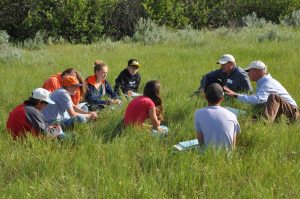DEADWOOD, S.D. (Sept. 9, 2013) – Public Lands Council (PLC) this Saturday wrapped up its 2013 Annual Meeting in Deadwood, S.D. Over 100 ranchers with public lands grazing rights in states across the West gathered to discuss matters affecting their industry and to consider projects and policies that will guide the organization’s future activities.
“Since 1968, PLC has been the voice in Washington, DC for ranchers who operate on public lands,” said Brice Lee, PLC President and a cattle rancher of Hesperus, Colo. “Each year, leaders of our industry meet in order to set priorities and discuss strategies that will help PLC provide a stable business environment for our members. This is important work: at stake is the health of the economies and landscapes of the West.”
The meeting kicked off on Wednesday evening with a welcome barbecue featuring guest speaker South Dakota Secretary of Agriculture, Lucas Lentsch. Over the following two days, attendees interacted with industry experts, congressional staff, and Bureau of Land Management (BLM) and U.S. Forest Service officials. The BLM also presented its Range Stewardship Award to the Beyeler family, who ranch near Leadore, Idaho. PLC’s Executive Director, Dustin Van Liew gave an update on PLC’s efforts promoting priority legislation such as the Grazing Improvement Act, fighting damaging new regulations and defending grazing in the courts. On Friday afternoon, members passed new policies and updated existing policies.
Also an important component of the meeting was the board of directors’ approval of projects to be funded by the Public Lands Endowment Trust. The Trust was established in 2011 to protect, enhance and preserve the public lands grazing industry. This year, seven new projects were approved, ranging from research projects; to development of software to improve resource planning; to providing PLC with new resources crucial to the expansion of the organization.
Lee, who continues in the second year of his two-year term as PLC president, was joined in leading the meeting by PLC Vice President and Idaho rancher, Brenda Richards and PLC Secretary/Treasurer and Utah rancher, Dave Eliason.
“To me, this year’s meeting revealed a turning point for our industry,” said Lee. “Thanks to the hard work and foresight of our staff and some of our industry’s leaders over the past few years, we have opportunities available to us that we’ve never had before—and it’s generating a can-do, optimistic attitude. I was very pleased with the 100-plus turnout, and can see that PLC’s influence is growing. I want to thank those individuals who took the time to come. Their impact on our industry’s future cannot be overestimated.”
–PLC Release







